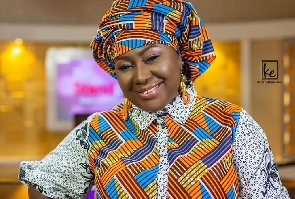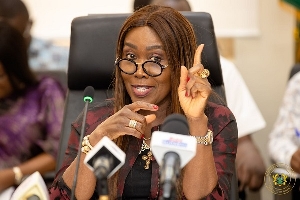- Home - News
- TWI News | TV
- Polls
- Year In Review
- News Archive
- Crime & Punishment
- Politics
- Regional
- Editorial
- Health
- Ghanaians Abroad
- Tabloid
- Africa
- Religion
- Election 2020
- Coronavirus
- News Videos | TV
- Photo Archives
- News Headlines
- Press Release
Opinions of Tuesday, 26 February 2013
Columnist: Boateng, Chris Gyamfi
NPP epitomizes the Groupthink Theory
My big brother Dawu opined on Ghanaweb’s Say It Loud on Monday 2/25/13 that the NPP is organized more like a cabal of Akan abusua stool whereby those in-charge are the owners and therefore go by the “Yente Gyae” syndrome. Dawu concludes that this stance by the NPP renders the rest of their followers only as mere noise makers without a stake. They don't question, they don't challenge, they are whipped to fall in line like zombies, and at worse these followers of theirs are like a herd of sheep being led to the slaughter house. That's how come the Akufo Addos have the party in a choke hold. I will however, stretched Dawu’s opinion further and juxtapose NPP’s action (s) to two prominent theories namely the Groupthink and the Cognitive Dissonance.
Indeed, the position espoused by the entire NPP in Ghana’s democratic dispensation amounts to what is dubbed Groupthink, a term coined by social psychologist Irving Janis in1972. Among other things, Groupthink occurs when a group makes faulty decisions because the group’s pressures lead to a deterioration of mental efficiency, reality testing, and moral judgment and NPP’s Nana Akumea exposed this hollow decision making within their party on Monday 2/25/13 when he stated without mincing words that indeed their party will collapse should they rescind their so-called court petition. This affirms the theory’s premise that groups affected by Groupthink ignore alternatives and tend to take irrational actions that dehumanize other groups as in the case of the NPP whose uniformed followers are made to believe by the likes of their defeated candidate that the SC will make him the president of the country. It must be emphasized that a group is especially vulnerable to Groupthink when its members are similar in background (Yen Akanfuo), when the group is insulated from outside opinions, and when there are no clear rules for decision making and these aptly describes the NPP.
Janis did well by cataloguing eight (8) symptoms of Groupthink which indicate the ills in a group and most of these symptoms are avidly held by the NPP but for the wont of time and space, I will dwell on three of them, thus:
1. That the group exhibits illusions of invulnerability and we see that the NPP operates on the premise that they are the embodiment of intelligence and that no one dares challenging them since they consider themselves not being vulnerable to any outside influence. This leads them to create excessive opportunities that encourage them and their followers to take many extreme risk actions.
2. Collective rationalization which I mentioned earlier on that makes a group behave like yahoos whereby they collectively assume that whatever action they embark upon is the best. This leads the group to discount and not considering the future implications of their actions.
3. That the group exhibits a belief in inherent morality whereby members believe in the rightness of their actions despite opposing views from outsiders. The group therefore ignores the ethical or moral consequences of their decisions and actions as Ghana is witnessing from the today’s NPP actions and inactions as they vehemently rejected admonitions from both Charles Wereko Brobbey and Kwame Pianim.
Albeit the above debilitating factors emanating from Groupthink, the theory prescribes some antidotes to help insulate and immunize groups from charting death paths thus enabling them to arrive at a cogent and effective decision. Some prominent antidotes are that the group’s leadership should strive to avoid stating preferences and expectations at the onset; does winning the 2012 “at all cost” and “Afghanistan” come to mind? Also, (and this is a very important ingredient among the antidotes) that at least one articulate and knowledgeable member of the group should be given a role to play the devil’s advocate and to question the actions, assumptions, rationales and aspirations of the group.
Interestingly but sadly enough, Charles Wereko Brobbey and Kwame Pianim decided to take on the devil’s advocate role stand but what did we realize? Outright insults from the NPP, vilifications, demonization and rejection to the extent that some NPP members suggested that Dr. Brobby had been bribed by the NDC!
This stance of the NPP leads to another theory called the Cognitive Dissonance which is a communication theory adopted from social psychology by Leon Festinger in 1951. This theory postulates that people tend to seek consistency in their beliefs and perceptions leading to one’s beliefs conflicting with others previously held beliefs indicating that when there is a discrepancy between beliefs and behaviors, something must change in order to eliminate or reduce the dissonance. This is what we saw a clique in the current NPP leadership and their followers doing to Wereko Brobbey and Pianim. In their desperate attempts to create meaning and to hold on to their tenuous beliefs that the 2012 elections were rigged in favor of the NDC, the clique was not prepared to entertain any divergent views hence the insults heaped on the two so as to reduce the dissonance created by Painim and Brobbey.
It’s obvious from the above theories that the NPP is on a collision course with itself as experts have concluded with empirical evidence that any group which engages in any of the theories I have dilated on will very soon implode but is there any means to salvage the NPP from this implosion? Your guess is as good as mine.
I welcome all opinions, additions and suggestions to this article and will also stomach all insults and blackmailings in stride.
Chris Gyamfi Boateng, Philadelphia, USA.
Entertainment









